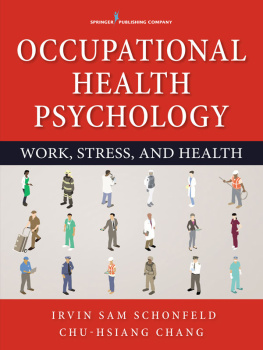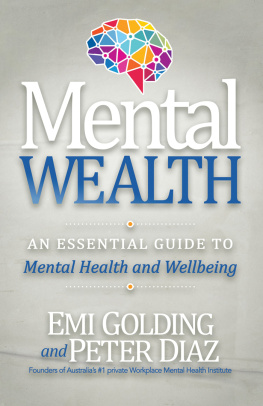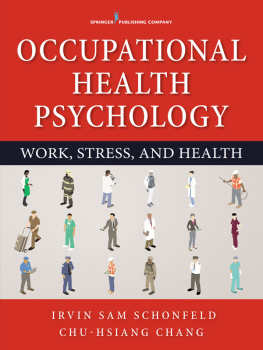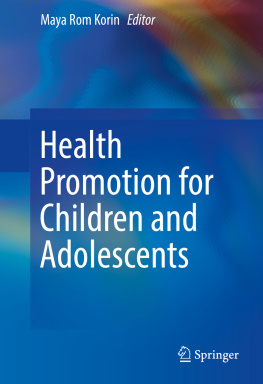Occupational Health Psychology
Irvin Sam Schonfeld, PhD, MPH, is a professor of psychology at the City College of the City University of New York (CUNY), and is a professor of educational psychology and psychology at the Graduate Center of CUNY. He earned a BS at Brooklyn College, an MA at the New School for Social Research, a PhD at the CUNY Graduate Center, and a postdoctoral degree at Columbia University. He is on the editorial board of, and is a reviewer for, a number of journals. He has published in Journal of Occupational Health Psychology, Journal of Clinical Psychology, Archives of General Psychiatry, Developmental Psychology, British Journal of Developmental Psychology, Journal of Abnormal Child Psychology, Clinical Psychology Review, Psychological Medicine, International Journal of Stress Management, Organizational Research Methods, Scandinavian Journal of Work, Environment & Health, Social Psychiatry and Psychiatric Epidemiology, Personality and Individual Differences, Pediatrics, Journal of Research in Science Teaching, and elsewhere. He is also the founding editor of the Newsletter of the Society for Occupational Health Psychology. Among other subjects, Professor Schonfeld teaches courses on occupational health psychology, experimental psychology, and the epidemiology of mental disorders. When he is not working, he enjoys hiking and backpacking, and won an award from the Appalachian Mountain Club (AMC) for ascending the 48 highest peaks in New Hampshire. As an amateur photographer, he has had two of his photographs selected by the AMC for awards.
Chu-Hsiang (Daisy) Chang, PhD, is an associate professor at the Department of Psychology of Michigan State University. She received her PhD in industrial and organizational psychology from the University of Akron. Her research interests focus on occupational health and safety, leadership, and motivation. Specifically, she studies issues related to occupational stress, workplace violence, and the intersection of employee motivation and organizational leadership particularly with reference to employee health and well-being. Her work has been published in Academy of Management Review, Academy of Management Journal, Journal of Applied Psychology, Journal of Organizational Behavior, Organizational Behavior and Human Decision Processes, Psychological Bulletin, and Work & Stress. She has served as an associate editor at Applied Psychology: An International Review and Journal of Organizational Behavior, and is currently serving as an associate editor at Journal of Applied Psychology.
Occupational Health Psychology
WORK, STRESS, AND HEALTH
Irvin Sam Schonfeld, PhD, MPH
Chu-Hsiang Chang, PhD

Copyright 2017 Springer Publishing Company, LLC
All rights reserved.
No part of this publication may be reproduced, stored in a retrieval system, or transmitted in any form or by any means, electronic, mechanical, photocopying, recording, or otherwise, without the prior permission of Springer Publishing Company, LLC, or authorization through payment of the appropriate fees to the Copyright Clearance Center, Inc., 222 Rosewood Drive, Danvers, MA 01923, 978-750-8400, fax 978-646-8600, .
Springer Publishing Company, LLC
11 West 42nd Street
New York, NY 10036
www.springerpub.com
Acquisitions Editor: Nancy S. Hale
Compositor: S4Carlisle Publishing Services
ISBN: 978-0-8261-9967-6
e-book ISBN: 978-0-8261-9968-3
Instructors Manual ISBN: 978-0-8261-9626-8
Instructors Materials: Qualified instructors may request supplements by e-mailing
16 17 18 19 20 /5 4 3 2 1
The author and the publisher of this Work have made every effort to use sources believed to be reliable to provide information that is accurate and compatible with the standards generally accepted at the time of publication. The author and publisher shall not be liable for any special, consequential, or exemplary damages resulting, in whole or in part, from the readers use of, or reliance on, the information contained in this book. The publisher has no responsibility for the persistence or accuracy of URLs for external or third-party Internet websites referred to in this publication, and does not guarantee that any content on such websites is, or will remain, accurate or appropriate.
Library of Congress Cataloging-in-Publication Data
Names: Schonfeld, Irvin Sam, author.
Title: Occupational health psychology / Irvin Sam Schonfeld, PhD, MPH, Chu-Hsiang Chang, PhD.
Description: New York : Springer Publishing Company, 2016. | Includes bibliographical references and index.
Identifiers: LCCN 2016041732 | ISBN 9780826199676
Subjects: LCSH: Psychology, Industrial. | Job stress. | Industrial safety. | Industrial hygiene.
Classification: LCC HF5548.8 .S3526 2016 | DDC 158.7dc23
LC record available at https://lccn.loc.gov/2016041732
Special discounts on bulk quantities of our books are available to corporations, professional associations, pharmaceutical companies, health care organizations, and other qualifying groups. If you are interested in a custom book, including chapters from more than one of our titles, we can provide that service as well.
For details, please contact:
Special Sales Department, Springer Publishing Company, LLC
11 West 42nd Street, 15th Floor, New York, NY 10036-8002
Phone: 877-687-7476 or 212-431-4370; Fax: 212-941-7842
E-mail:
Printed in the United States of America by Gasch Printing.
In memory of my parents, Ruth and George Schonfeld.
Irvin Sam Schonfeld
Contents
From Irvin Sam Schonfeld
From Chu-Hsiang Chang
Acknowledgments From Irvin Sam Schonfeld
The decision to write a book about occupational health psychology has a history, and that history illuminates why the book was written. The story of the book begins several years ago when Nancy S. Hale, who became my editor at Springer, made a surprise visit to my office at City College. She asked me to write a book about occupational health psychology.
I agreed to write the book because I have been conducting research in occupational health psychology (OHP) since before I knew the existence of such a term. I came to the subject matter of what would become OHP as a result of the convergence of a number of influences. One influence, naturally enough, was my own work experience. My first job was that of a math teacher in a dangerous urban public school. In that job, I had informally observed the corrosive effects of job stress, although at the time I had not imagined that one day I would be conducting research on job stress. The job stressors I observed were in the form of disrespectful behavior among students toward teachers, student-on-student violence, and student-on-teacher violence.
I left teaching to pursue a doctorate in developmental psychology. I was particularly interested in cognitive development, and conducted research on the foundations of childrens cognitions about quantity. After earning a PhD, I failed to obtain the academic position I wanted, and took a job as the director of evaluation in the Office of Special Programs in a school district. My job required me to evaluate grant-supported educational programs and, more importantly, to write grant applications to help support new district initiatives. The head of the office, the individual to whom I reported, was a man who was a very effective grant-writerwhich meant that the superintendent would never fire him. He, unfortunately, was a screamer. With a ferocity I hadnt seen outside of a schoolyard, he once berated a secretary; as a result, she broke down in tears in the middle of the office. I observed another woman, the school districts administrator for math programs, someone whom I had personally tried to protect, begin to shake and stammer, and then break into tears










